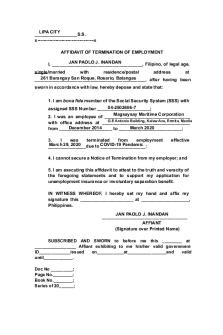Tort -course of employment PDF

| Title | Tort -course of employment |
|---|---|
| Course | Tort |
| Institution | University of Chester |
| Pages | 2 |
| File Size | 43.2 KB |
| File Type | |
| Total Downloads | 23 |
| Total Views | 138 |
Summary
This document provides that the employer can only be liable if the employee commits a tort and the tort must be committed in the course of the employee’s employment supported by Morris v CW Martin (1966), Majrowski v Guy’s and St Thomas’s NHS Trust (2006), and Poland v Parr & Sons (1927)....
Description
There must be a tort
The employer can only be liable if the employee commits a tort and the tort must be committed in the course of the employee’s employment. Although negligence is the tort most commonly giving rise to vicarious liability, an employer could also be vicariously liable for an employee’s intentional tort such as theft.
Morris v CW Martin (1966)
The employer was liable when one of its employees stole the plaintiff’s mink coat which she had left to be cleaned.
Poland v Parr & Sons (1927)
The employer was liable in trespass to the person when one of his employees, who reasonably believed that some children were stealing the company’s property, struck and injured one of the children.
Majrowski v Guy’s and St Thomas’s NHS Trust (2006)
the House of Lords ruled that the common law principle of strict liability for another’s wrongs was just as applicable to breaches of statutory obligation. Under the Protection from Harassment Act 1997, conduct amounting to harassment of another is an offence giving rise to a civil action.
The Court of Appeal and upheld by the House of Lords, which ruled that where a claim met the ‘close connection’ test, an employer might be vicariously liable for breach of a statutory duty placed solely and personally on the employee for harassment committed in the course of employment.
The tort must be committed in the ‘course of employment’
The definition of ‘course of employment’ is crucial because the general rule is that if an employee committed the tort within the course of his employment the employer is liable; if the employee acted outside the scope of employment the employer is not liable....
Similar Free PDFs

Tort -course of employment
- 2 Pages

Contract of employment
- 3 Pages

Tort of Nuisance
- 12 Pages

Outline of tort law
- 4 Pages

The Tort of Nuisance
- 6 Pages

Tort of Negligence
- 8 Pages

TORT LIST OF Cases
- 11 Pages

Law of Tort exam
- 6 Pages

Revision - Tort - Tort Law
- 32 Pages
Popular Institutions
- Tinajero National High School - Annex
- Politeknik Caltex Riau
- Yokohama City University
- SGT University
- University of Al-Qadisiyah
- Divine Word College of Vigan
- Techniek College Rotterdam
- Universidade de Santiago
- Universiti Teknologi MARA Cawangan Johor Kampus Pasir Gudang
- Poltekkes Kemenkes Yogyakarta
- Baguio City National High School
- Colegio san marcos
- preparatoria uno
- Centro de Bachillerato Tecnológico Industrial y de Servicios No. 107
- Dalian Maritime University
- Quang Trung Secondary School
- Colegio Tecnológico en Informática
- Corporación Regional de Educación Superior
- Grupo CEDVA
- Dar Al Uloom University
- Centro de Estudios Preuniversitarios de la Universidad Nacional de Ingeniería
- 上智大学
- Aakash International School, Nuna Majara
- San Felipe Neri Catholic School
- Kang Chiao International School - New Taipei City
- Misamis Occidental National High School
- Institución Educativa Escuela Normal Juan Ladrilleros
- Kolehiyo ng Pantukan
- Batanes State College
- Instituto Continental
- Sekolah Menengah Kejuruan Kesehatan Kaltara (Tarakan)
- Colegio de La Inmaculada Concepcion - Cebu






